
Millions of people voluntarily avoid gluten, a protein found in wheat-based foods like bread, cereal and pasta.
Those with a wheat allergy, celiac disease (about 1% of the population) and certain other autoimmune conditions get very sick if they eat it.
However, an extra 12% of people report digestive symptoms after eating gluten-containing foods… despite not having a wheat allergy or celiac disease.
But new research from Norway suggests it’s not gluten that causes issues for these people… it’s a FODMAP called fructan.
What Is A Fructan and Fructan Intolerance?

Fructans are a type of short-chain carbohydrate often referred to as FODMAPs.
They can cause unpleasant digestive symptoms for sensitive people, especially those with irritable bowel syndrome (IBS) and inflammatory bowel disease (IBD).
Fructans occur in large quantities in:
- wheat, barley and rye
- garlic
- onions
- chickpeas
- dates and prunes
- raisins
- watermelon
Those who experience digestive problems after eating fructans very likely have a fructan intolerance. It’s basically the same concept as those with a lactose intolerance who eat dairy, or those with a fructose intolerance who eat honey.
Summary: Fructans are a type of carbohydrate often referred to as FODMAPs. They are likely to cause strong digestive symptoms in those who are fructan intolerant. Rich sources of fructans include wheat, garlic, onion, chickpeas and more.
Non-Celiac Gluten Sensitivity (NCGS) Is Not Your Issue
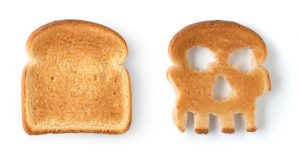
Non-celiac gluten sensitivity (NCGS) or “gluten intolerance” is the term used to describe those who react negatively to wheat foods but don’t have celiac disease.
NCGS is a real thing, but about 4 in 5 people who think they have it don’t.
A recent review study of data from 1312 adults found only 16% of those who respond positively to a gluten-free diet actually have a gluten sensitivity (1).
The remainder of people have other sensitivities or a nocebo response to gluten, which means they react to non-gluten foods as well.
FODMAP researchers suspected that these people might actually be sensitive to fructans, as they are found in many foods with gluten, such as bread and pasta.
New Study Confirms This Theory
A new Norwegian study published in Gastroenterology looked at 59 people who did not have celiac disease yet found digestive relief with a gluten-free diet (2).
Subjects were randomly assigned to eat seemingly identical muesli bars with either gluten, fructans, or neither (placebo) for seven days.
They then crossed over into a different group, until they had completed all three bar diets and recorded their digestive symptoms.
Researchers found that symptoms of IBS, especially bloating, were 15% worse after eating the fructan muesli bar compared to placebo.
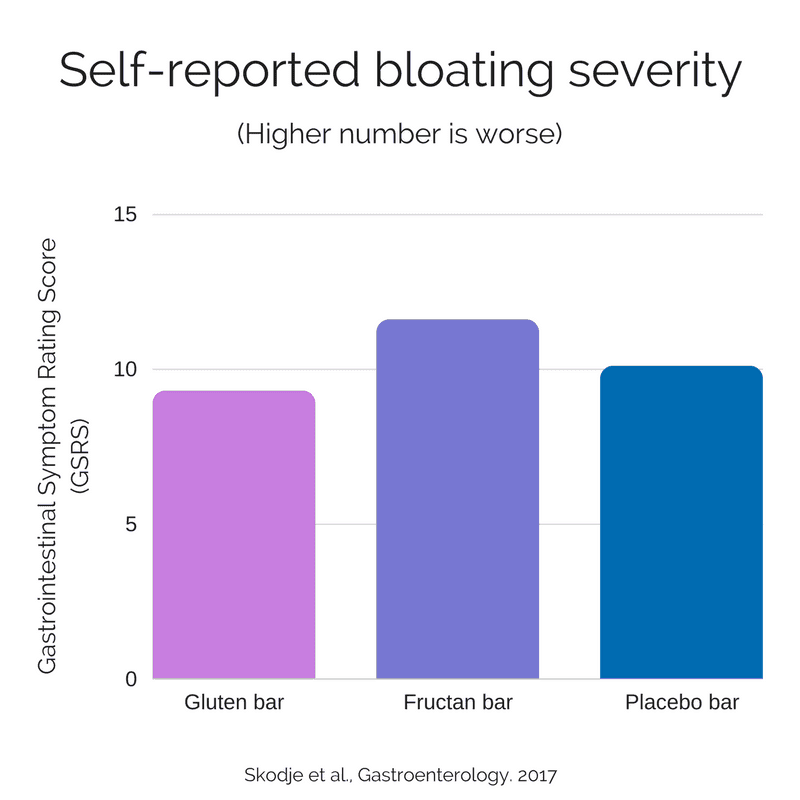
Interestingly, the gluten bar had no effect on symptoms, which suggests gluten is not the culprit after all.
Lead author Gry Skodje believes these findings strongly support the idea that fructans in wheat are the trigger of digestive symptoms, not gluten.
It also helps explain why researchers have been left stumped trying to figure out how gluten causes issues for non-celiacs.
Ideally, the next step would be a larger study that controls the participants outside food intake as well.
Summary: Research shows 4 in 5 people who believe they are sensitive to gluten are actually not. A new clinical trial suggests the likely cause of their digestive symptoms are fructans, which are also found in wheat.
It’s Not The Gluten, But Gluten-Free Will Still Help You
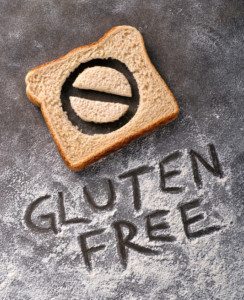
The reason a gluten-free diet helps you feel better – even though you aren’t sensitive to gluten – is simple.
Gluten-free grains are automatically low in FODMAPs (including fructans).
Likewise, the removal of gluten from wheat also removes the majority of FODMAPs. That’s why low FODMAP diet plans are gluten-free.
So by choosing gluten-free breads, pastas and cereal, people have inadvertently been cutting out their fructans as well, leading to symptom relief.
For this reason avoiding gluten can still be particularly useful for those with fructan intolerance.
The Problem With A Gluten-Free Diet
However, a gluten-free diet may be overly restrictive of gluten-containing foods that are low in fructans.
For example, sourdough bread has gluten but its fermentation process removes the fructans. Soy sauce also contains gluten but is low in fructans. Beer comes to mind as well.
These are off-limits on a gluten-free diet, yet unnecessary to restrict for the vast majority.
The other issue is that most people with digestive issues don’t ever fully recover on a gluten-free diet. This is because FODMAPs (including fructans) are the likely culprit and a low FODMAP diet is what’s actually required.
If you’re still unsure about your perceived gluten sensitivity, try this:
Think about if you’ve ever had excessive gas, bloating or diarrhea several hours after eating a lot of garlic, chickpeas (hummus), dates or watermelon…
It’s the fructans.
Would you like more information on how to start a low FODMAP diet?
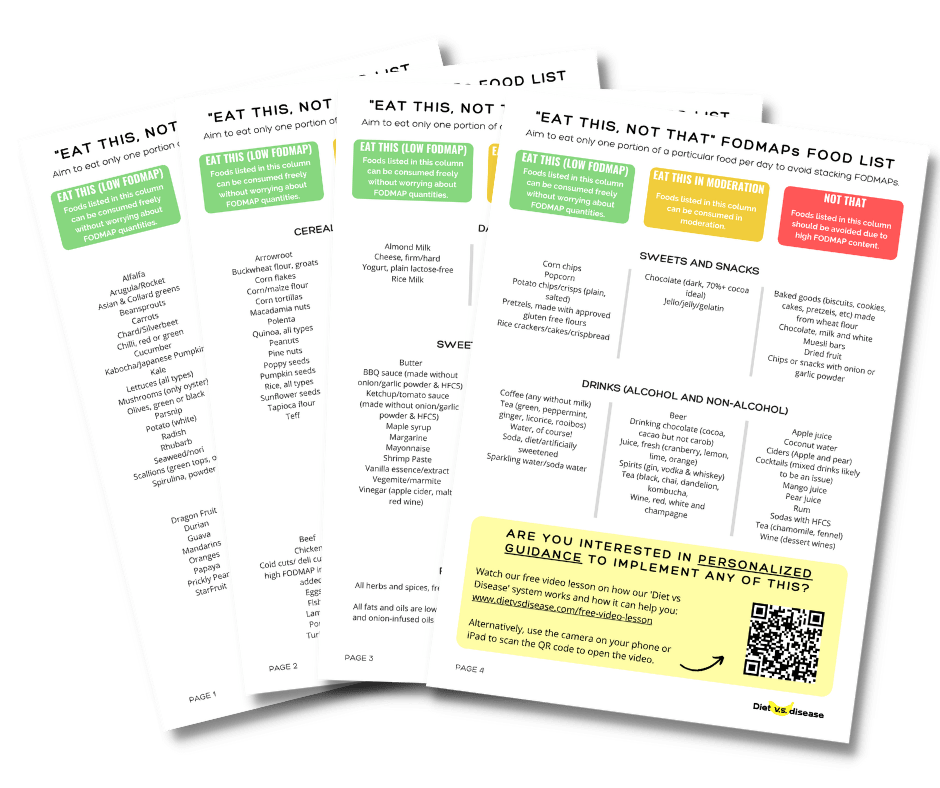
Tap the blue button below to download our “Eat This, Not That” list as well as additional resources for IBS and digestive issues (it’s free!)

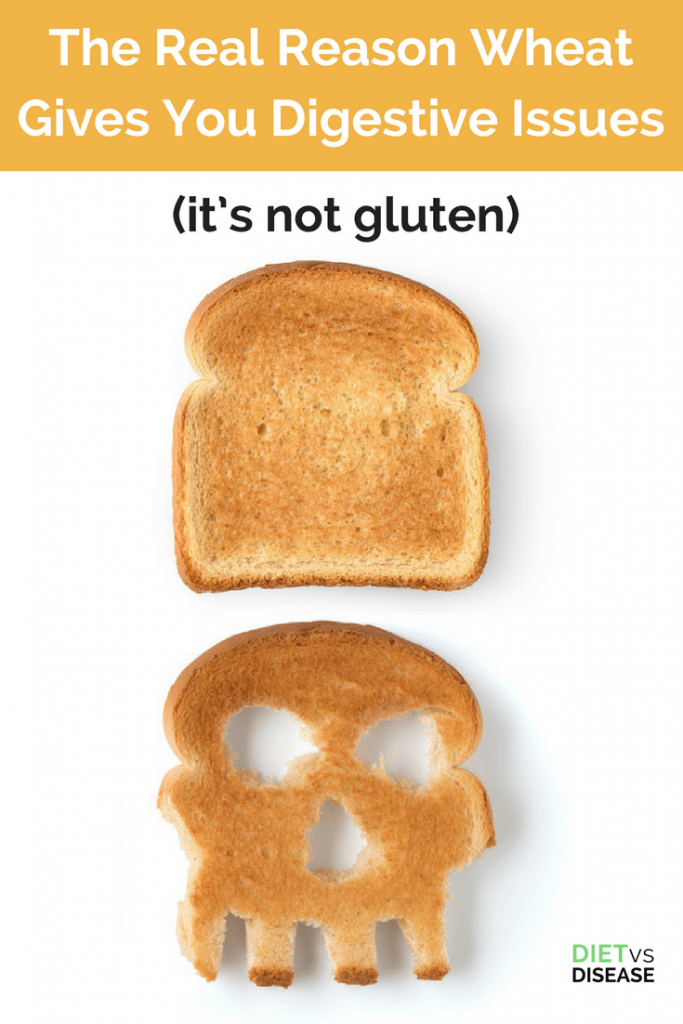
My mother is 95 years old and a couple of years ago developed IBD with diarrhea. Presently her diet is quite restricted as she avoids sugar, several types of vegetables (carrots especially). She eats every morning a french roll with fresh white cheese. She’s tried FODMAPS diets but not quite successfully, because everytime she tries to reintroduce the restricted foods she presents diarrhea. She’s living on oil-free rice, beef and chayote (pear squash), cooked apple and sugar-free jelly, guava juice. I recently discovered that she may present fructose sensitivity and the reason for the diarrhea may be minor infections spread through the bowel. We really don’t know anymore how to make her diet less monotonous and avoid malnutrition. It was suggested that the reason for this diarrhea might be pancreas aging, so that she is not producing sufficient pancreatic enzymes. It´s getting quite difficult.
Take a look at this list of good and bad foods for your mother.
Apples are high in fructans for instance, so bad for her.
https://www.ibsdiets.org/fodmap-diet/fodmap-food-list/
The website is just a shell for advertising, but the list is easy to use.
There are many ways to test what foods are good or bad, however the devil is in the details.
Every ingredient must be reviewed in every food.
I’m working on an easy way to stabilize a diet and validate the Fructan mal-absorption issues.
Also remember that onions and garlic are bad and very hard to easily remove from her diet.
JB
Hi Renata, sorry to hear about your mother. If you haven’t already seen one, a dietitian specialising in this area may be of help. Good luck
omit the apple, high in fructose
Apples are very high in FODMAPS, I’d be careful with that… I’ve been following the Specific Carbohydrate Diet to successfully relieve diarrhea I layer the FODMAP diet over SCD and it works. I would recommend a very good quality digestive enzyme because you are right- she won’t have the enzyme activity to enable proper digestion. Please see if she is anemic and ask for a calprotectin test to discover if she has bowel inflammation. Monotony is far better than constantly feeling sick. I like the Nikken brand 4:20 Digestive Enzymes but any should help. Ask her doctor for testing of her B12 and if she isn’t taking an active folate & B12 or vitamin D please give them to her, she will benefit greatly.
Hi Kelly: What exactly Digestive Enzyme you talking about and does it help to solve
Fructan/Fructose problem? Please advise where can I get this DE,THANKS!
Hi,
fructans as well as other oligosaccharides are referred to be so called soluble dietary fibres and a part of healthy diet. In Japan they are used as sweetener since early nineties and there are no drawbacks appeared. So my question is: is one, very thin study enough to justify the evilness of oligosaccharides? Monash University in Australia seems to play with the term FODMAP and crucifies oligosaccharides, but I couldn’t find any facts on their website. So whole thing looks like nonsense.
Hi Marc, fructans and oligosaccharides are definitely healthy; they are prebiotics, so bacteria need them to feed on. In those with food sensitivities, they tend to have bacteria in their large colon that they shouldn’t, so having fructans causes digestive issues. Monash University are advising that this particular demographic cut out those fructans for a set period of time (elimination phase) and then re-introduce them one by one, to see if it is indeed the fructans that are causing the issues. No one is hating on oligosaccharides, and people who do not have food sensitivities are not recommended to cut these foods out of their diet.
That’s false – it’s not just a single study. The evidence base for the FODMAP elimination diet as curative of a range of IBS symptoms is continually growing. It’s had more success than any other dietary intervention for those with GI symptoms typical of IBS but who are not coeliac or have Crohn’s/IBD. The results of various studies are published in peer-reviewed journals and follow proper randomised, blind, controlled procedures.
You’re framing your point as an attack on an institution (one university) – in reality, it’s one research team (among others) who are uncovering the issue of FODMAP digestion. While it’s easier to use the title of an institution and make it sound shadowy and dodgy, it’s entirely fallacious. There’s nothing suspicious about this encouraging body of research.
As a personal aside, I’m eternally thankful to my GP for introducing me to the diet. It has made the world of difference (specifically cutting out onion in all its mischievous forms, garlic, and large quantities of wheat).
Wow! Apples have been like Superman and Cryptonite for me since I was a child. Can’t even stand the smell. Can’t digest onions, garlic or anything like that. Causes diarrhoea and bloating. I have had IBS for years and having just had a bone marrow transplant which involved a massive dose of chemo, my scorched intenstnes have still not recovered. I am on a FODmap diet (well, supposed to be but just not very good at keeping to it) and constantly tested for intollerances but nothing concrete has been diagnosed. In hospital, the only foods that I could keep down were toast, chicken and mash. When I cam out I got a sickness bug that took 6 weeks to get better. My system is shot! They suspect an inability to absorb fat too. Very interesting article and comments. Thank you. Apples were the light bulb moment for me!
An anti-gliadin blood test should tell the story. No need to guess.
Current most common Gliadin test is NOT enough. There are MANY other TYPES of Gliadin & Glutens. Doctors only test for ONE though. So, then doctors are missing the others and end up telling patients they are normal and not reactive. Sad. Watch this great short video presented by Sean Croxton in 2013. He explained it very well. https://www.youtube.com/watch?v=pNAyjFaRnjU&t=192s
I eat a lot of those high fructan foods (that are considered gluten free), and I have no GI symptoms. However, when I eat pure gluten in the form of wheat/rye/barley etc. I get a “Mega-bloated” stomach and a lot of GI effects. I have weight lost and anemia, eating gluten makes me too sick to stick to it so that I can take the celiac test.
Try sourdough bread. If you can tolerate it you can use it to expose yourself to the gluten so you can test for celiacs
just another reason not to eat wheat….and there are more ….
Wow. Yes. I wonder if “Rice” should be included too, because I have met many people with gluten intolerance or celiac that cannot have Rice either or any grains. I gave up ALL grains, even corn due to bloating, inflammation, fluid retention, fatigue, joint pain & moodiness while eating them, even rice! gluten messes “me” up big time, even affects my speech, so I must avoid & no cheats.
Betcha herbicides like *Glyphosate (Roundup) are killing off the specific good gut bacteria and enzymes we need to properly digest these Fructans, just like Oxalates, Gluten and how we break down excess Histamine too. I read that some of these “specific” good bacteria are not replaceable by Probiotic capsules, because we get them from birth & life exposure. Glyphosoate is now known to cause Non-celiac gluten intolerance and increase of Histamine. #GoOrganic as much as possible.
Yep, I’ve learned over the past 18 months that fructans are my issue. The best thing is, I can eat a few bites of bread or cookies, or cake at parties now! I can tolerate a few bites, which is lovely.
So, I cut out gluten-I had really bad reactions after drinking beer, or eating black bean burgers. But, I also cannot handle garlic or onion if they’re too high on the ingredients list. So, fructans are NOT an issue in beer, right? But, I have a bad reaction after drinking any beer. Is it possible to have a gluten sensitivity and not be able to handle certain foods? I seem fine after eating raisens and watermelon too. My worst reactions now seems to be when I don’t think about it, and accidentally use the same jar of jelly that I use for my kids-cross contaminated from their bread.
Get Xifaxan. 550mg three times a day for 14 days. After 15 years of Allium intolerance, I can now eat alliums.
Always had onion/garlic problems since childhood, and in my 70’s, everything is WAY worse (bread, apples, etc., etc.) . Got wise to fructans, and now I use garlic-infused olive oil (fructans don’t dissolve into oil!) and buy Fodzyme, which is pricey but effective. I have a subscription and just cancel every other month. A tiny measuring spoon that’s half the size of one dose is very, very helpful. I’m still cautious with onions, though.
The title of this article is incredibly dismissive and misleading. If that’s what it takes to drum up business, I question your medical ethics.